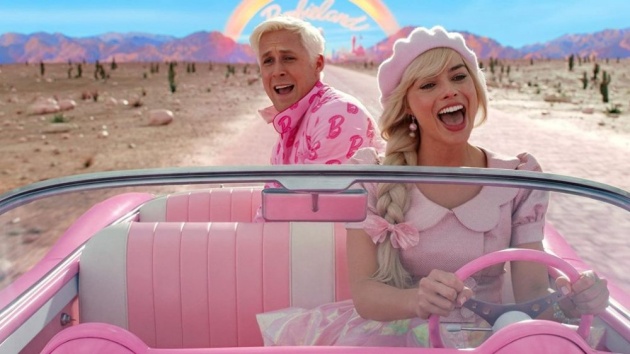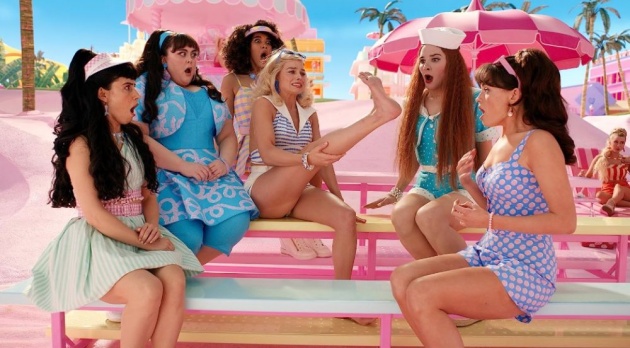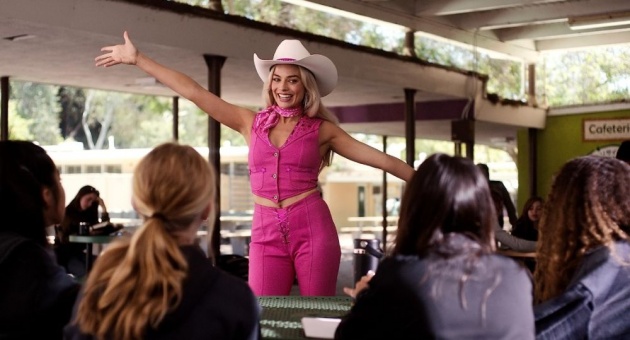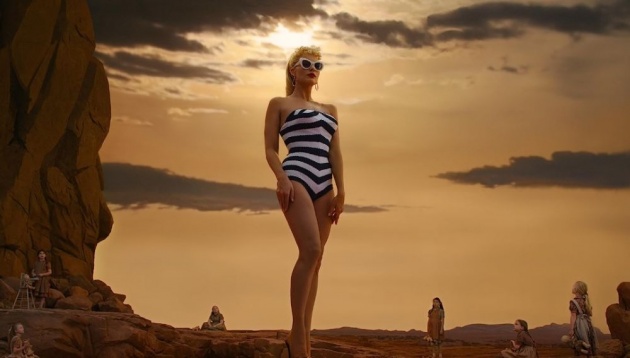
Pictured: Driving along in my automobile, Stereotypical Barbie (Margot Robbie) is surprised to be joined by Ken (Ryan Gosling) in a scene from 'Barbie', the first full-length live action film to feature the titular child's plaything co-written (with Noah Baumbach) and directed by Greta Gerwig. Still courtesy of Warner Bros (US/UK)
Greta Gerwig (Lady Bird, Little Women) is the first woman Hollywood film director to make three hit movies in a row since Penny Marshall between 1986 and 1992 (Jumpin' Jack Flash, Big, A League of Their Own). Moreover, she’s a writer-director. That’s unheard of. The reported opening US box-office gross for Barbie, a film about a girl’s toy used for female empowerment, isn’t just phenomenal by the standards of woman directors - $70 million earned in one day - but by Hollywood norms. Greta Gerwig outperformed Tom Cruise at this summer’s box office. How crazy is that? If this does not make Hollywood’s biggest star want to work with a female director for the first time in his career, I don’t know what will? Actually, I can guess – it might be some nutty religion that tells him not to take orders from a woman.
Barbie benefits from its association with intellectual property. Foremost, it’s a doll enjoyed and accessorised by young girls with moderately well-off parents around the world. Gerwig engages with the brand and twists it into different positions, rather like playing with the toy itself. Undoubtedly she enhances it, because for a whole new generation of young girls, actress Margot Robbie is Stereotypical Barbie. All rights reserved.
The first trailer for Barbie forms the opening of the film. A narrator (Helen Mirren) tells us that for years young girls always enjoyed playing with dolls. But they were always representations of babies. Girls were being trained for motherhood. How fun is that? (Mirren allows maximum disdain to infect her plummy English accent.) But then Barbie (cue giant-sized Robbie in a black and white swimsuit and a friendly smile) appears. The girls then smash their dolls in a parody of the opening of 2001: A Space Odyssey. A fragment of plastic baby is tossed into the air. Cut to title.
Gerwig co-wrote the script with her husband, Noah Baumbach, a noted writer-director himself who worked with her on scripts for Frances Ha (loosely based on Gerwig’s life and my equivalent of cinematic comfort food) and Mistress America (more like the packet of half-stale popcorn that you only open if there’s nothing else in the larder). The opening of Barbie is the first of three pop-culture references designed to bring knowing smiles to adults’ faces; the second refers to Depressed Barbie’s viewing habits, the third to mansplaining. Gerwig doesn’t aim her film at young children – a reference to genitalia closes that door – rather to teenagers who may have played with the doll before moving to video games. These days, I imagine children playing ‘Housing Ladder’, a game they can only win if they marry into wealth or both parents die. Gerwig introduces us to Barbie Land, where everything except hair and fabric is plastic and human behaviour is simulated in living make believe, like having a shower with no water and pretending to drink from an empty cup. Barbie literally has an open house – and you can buy yours today for £300. You can see what I mean about needing to be moderately well-off; that’s why it is called a Dream House. She waves to her neighbours who all share her name (cue a chorus of ‘Hello Barbie’). In Barbie Land, no one asks how anyone is doing because everyone is doing great. There is an unlimited source of energy, endless sun. The waves are inviting but plastic. Every Barbie has their Ken, an attractive male accessory with a charismatic smile and a stripy bandanna. (Possibly available on eBay.) Life, as Frances Halliday might say, is ‘super fun’.
There is a whole bunch of Barbies played by moderately well-known actresses (Issa Rae as President Barbie, Emma Mackay as Emily Bronte Barbie – sorry, Margot Robbie lookalike Barbie). The Kens, headed by Ryan Gosling (rocking an open chested denim shirt with cut off sleeves and rinsed blond hair) are played by a cast of up-and-comers (Simi Liu, Kingsley Ben-Adir, Ncuti Gatwa). Ken, the narrator tells us, is only happy when Barbie looks at him. Gosling’s Ken is a puppy constantly begging for a treat who challenges Simi Liu’s Ken in an endless game of ‘I’m more physically impressive than you are’. (Men compete, women compliment.) Ken is also endlessly optimistic, even though Barbie keeps him at arm’s length. The dolls never kiss on the lips because that is inappropriate behaviour for children under ten, just like reading a book in Florida.
In Gerwig’s Barbie Land, the dolls are an extension of children’s aspirations. They can be doctors, presidents or create the most powerful weapon the world has ever seen. Like a significant number of people, I watched Barbie on the same day as seeing Oppenheimer. However, the girls that play with them transfer their anxieties onto the dolls. Bear in mind these are middle class anxieties. Who has £300 for a Dream House? For reasons that she cannot explain, in the middle of a well-choreographed dance number, Robbie’s Barbie asks, ‘do you guys ever think about dying?’
From then on, Stereotypical Barbie’s life changes. The pretend shower is cold. Her fake toast is burnt. She doesn’t float down to her car but falls down. She doesn’t understand why she is feeling this way. This is probably the closest Gerwig gets to subtlety, hinting at mental health issues. Barbie is advised to visit Crazy Barbie (Kate McKinnon), who is described as such ‘behind her back and to her face’ (another on-the-nose line). Suffering from flat feet – no more lifted heel – Barbie visits the Crazy House.

Pictured: Revealing her heel failure, Stereotypical Barbie (Margot Robbie, leg raised) in a scene from the American fantasy film, 'Barbie', co-written (with Noah Baumbach) and directed by Greta Gerwig. Still courtesy of Warner Bros. (US/UK)
McKinnon is inspired casting. Crazy Barbie is the role she was born to play, though technically no one is born to be an actress, they can be a plumber, schoolteacher or create the most powerful weapon the world has ever seen. Crazy Barbie has short hair and marker on her face. She constantly does the splits; no one knows why. McKinnon leans into her demented mania, a grateful host as opposed to a hateful ghost, who shows Stereotypical Barbie the relationship between Barbie’s World and the Real World – one of them has – you guessed it – potholes. Barbie is told she can get there using every transport means imaginable – and change in Montreal. (Well, maybe not the latter) Barbie has to find the girl who is playing with her and make her happy again. ‘How will I know when I find her?’ Barbie quite reasonably asks. Crazy B stares at her. ‘You’ll just know.’
Enthusiastically waved goodbye by her slumber party friends – no worrying about the washing up if you only pretend to get hammered – Stereotypical Barbie sings to herself as she approaches the border of Barbie Land, only for Ken to join in. He doesn’t take no for an answer. You wonder how that’s possible in Barbie Land with women in charge. Stereotypical Barbie reluctantly allows him to stay with her as they cross into the Real World. It isn’t entirely clear why Barbie isn’t twelve inches tall in a land of giants – she is a doll after all – but the whole film is the work of a young child’s imagination, one who has read a lot of feminist literature.
On roller skates, Barbie immediately feels uncomfortable, being looked at and commented upon. A man touches her bottom and Barbie punches him in the face. (‘Karate Barbie’ – in stores now.) She thinks that she’ll meet women at work at a construction site and is surprised by the reaction. Ken attracts an audience too, but he doesn’t mind being appraised, finding it pleasant. But where can Barbie find children? A school. I can’t imagine having schools in Barbie Land – only universities, accounting for the lack of basic knowledge. We can’t reasonably expect the Barbies to create the most powerful weapon the world has ever known. Ken decides to head for the library, but not before trying to find work as a lifeguard. ‘Do you swim?’ ‘No, I beach.’ ‘I can’t use you.’

Pictured: 'Hello, I'm Barbie. Will you thank me for making your lives immeasurably better?' Stereotypical Barbie (Margot Robbie) introduces herself to a group of school children in a scene from 'Barbie', an American film co-written and directed by Greta Gerwig. Still courtesy of Warner Bros (US/UK)
What happens to Ken falls into spoiler alert category. Suffice to say, that if they had travelled to Florida, Ken might not have found the books that messed with his mind. Barbie is prevented from talking to a girl, Sasha (Ariana Greenblatt) – but not for the reasons we expect. A woman objects not because she needs to protect Sasha from strangers – especially those who have been arrested twice for causing a disturbance and being unable to pay for clothes – but because Sasha is a mean girl. Barbie is undeterred. ‘Hello,’ she says, ‘I’m Barbie. Aren’t you going to thank me for making your lives immeasurably better.’ No, Sasha will not thank her, denouncing Barbie as a representation of capitalist culture designed to keep women in their place by placing unrealistic expectations on them. That’s some mouthful. Sasha has clearly read feminist literature and ‘Das Kapital’. Barbie would have been better off in Florida. She is shaken and sits down at a bus stop, pausing only to remark that to the old woman waiting for a bus (costume designer Ann Roth) that she is beautiful. ‘I know,’ the old woman replies. Just then Barbie is collected by representatives from the Mattel Corporation who have been alerted – by the method of whispers – to her presence in the Real World. She is taken to see the CEO (Will Ferrell) but not before she is seen by Sasha’s mother, Gloria (America Ferrera).
It was brave of Gerwig to cast former Ugly Betty star Ferrera as the principle Real World viewpoint character, but Ferrera is meant to complement Robbie, not compete with her. To say anything more about the plot is plain wrong, but it hinges on The Last Temptation of Ken, which undoubtedly would not play in Florida.

Pictured: A revolution in children's dolls, Barbie (Margot Robbie) models a black-and-white swimsuit in a scene from 'Barbie', an American fantasy film co-written and directed by Greta Gerwig. Still courtesy of Warner Bros. (US/UK)
Rhea Perlman turns up as the ghost of Ruth Handler, the creator of Barbie. ‘I look nothing like you,’ Barbie remarks. ‘I know,’ Ruth replies, the second ‘I know’ of the movie. The film emphasises knowledge and power whilst relying on fantastical elements. I was briefly reminded of another film associated with the sea, The Spongebob Squarepants Movie (a second example of cinematic comfort food). It too features two characters on a road trip as well as brainwashing. As far as I know, though, the Mattel CEO does not have a bald spot.
Michael Cera appears as Allan, a discontinued doll who lives in Barbie Land but doesn’t have a place. He has a grace note in the film’s Third Act, with Cera reprising some of the moves last exhibited in Scott Pilgrim vs. the World.
Few films about a woman’s place in a man’s world have been as explicit as Barbie. What might be subtext in another film is the main text here. Gerwig also negotiates, in the film’s finale, a reversal of gender dynamics, Stereotypical Barbie remarking that ‘Barbie Land cannot continue the way it did before.’ Ken has feelings for Barbie. How can these be resolved? For Gerwig, this is done through a grammatical construction – the use of the word ‘it’s’.
Barbie has been described as woke. This assumes that ‘woke’ is a negative descriptor. The film certainly speaks to an American (college) audience more than an English one - if my Twitter feed is representative of the discourse. It is pleasing that a major confrontation is resolved through the medium of dance, Gerwig acknowledging the influence of Hollywood musicals. It also celebrates the power of oratory. Gloria’s speech about life in the Real World has a transformative effect. Gerwig uses ‘old Hollywood’ to speak to a new audience.
Barbie discovers that she can experience emotion and at one point says she likes it, although the film is ambiguous on this point. Does being sad make one a better person? Statistically it is said to improve empathy, but it can also turn to anger. In the film’s best line, Ken remarks that he was only interested in patriarchy because he thought it had to do with horses. He saw police officers on horseback and was mesmerised. The film deftly negotiates tensions between characters and has a late cameo from Welsh actor Rob Brydon as a discontinued Ken. There is also a star cameo – no googling.
The other Barbies don’t really stand out, except for Pregnant Barbie – another discontinued line. The line about genitalia spoken in the Real World comes from left field. It doesn’t feel earned. How would Barbie and Ken know what they haven’t got? The final line of the film, spoken as Barbie enters a tall building, about to realise her potential; refers to this point. It also reverses, to some extent, the opening.
Barbie is a ‘have-your-pink-frosted-cupcake-and eat-it’ sort of comfort food. The matinee audience in Dover, Southeast England (home of Brexit) watched it with a form of scepticism that you would also expect to encounter at Republican Party rallies in Florida. Different coast, same closed minds.
Reviewed at Cineworld Dover, Screen Two, Southeast England, Saturday 22 July 2023, 11:50 screening



